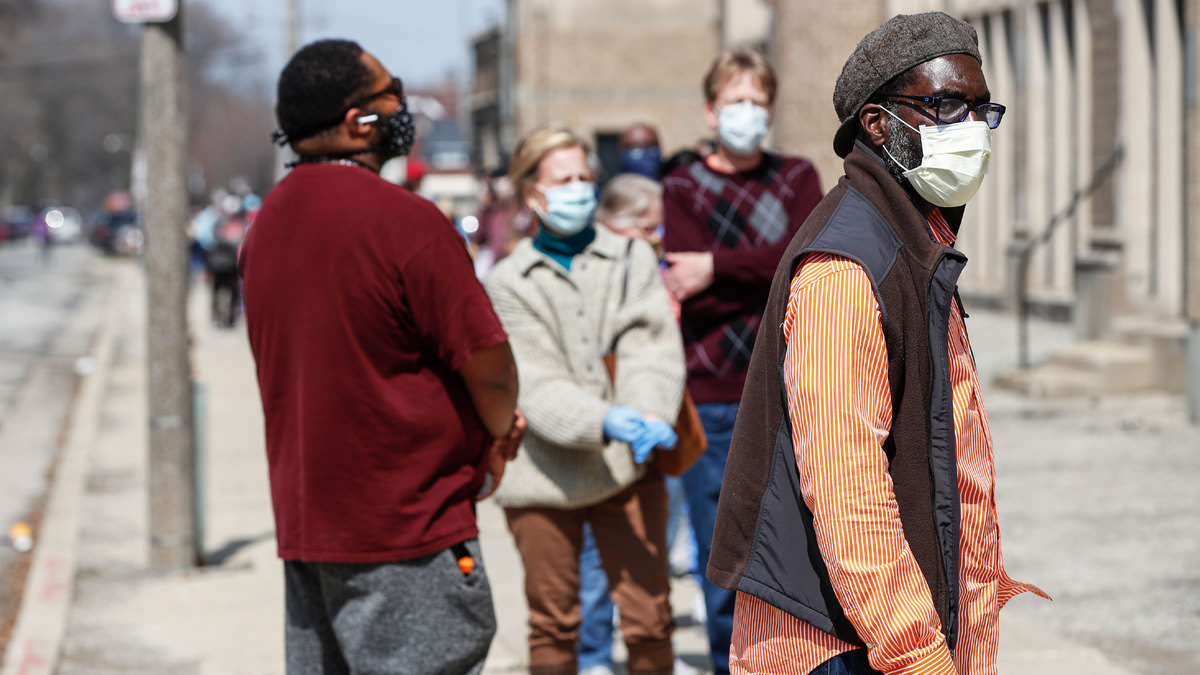
LINDA GREENHOUSE, NY TIMES
The Supreme Court just met its first test of the coronavirus era. It failed, spectacularly.
I was hoping not to have to write those sentences. All day Monday, I kept refreshing my computer’s link to the court’s website.
I was anxious to see how the justices would respond to the urgent request from the Republican National Committee and Wisconsin’s Republican-controlled Legislature to stop the state from counting absentee ballots postmarked not by Tuesday’s election but during the following few days.
A federal district judge, noting that Wisconsin’s election apparatus was overwhelmed by the “avalanche of absentee ballots” sought by voters afraid to show up at crowded polling places, had ordered the extra time last Thursday, with the full support of the state’s election officials. Was I the only one left in suspense on Monday, holding out hope that the five Republican-appointed Supreme Court justices would put partisanship aside and let the District Court order stand?
In early evening, the answer landed with a thud. No, they would not.
In more than four decades of studying and writing about the Supreme Court, I’ve seen a lot (and yes, I’m thinking of Bush v. Gore). But I’ve rarely seen a development as disheartening as this one: a squirrelly, intellectually dishonest lecture in the form of an unsigned majority opinion, addressed to the four dissenting justices (Need I name them? Ruth Bader Ginsburg, Stephen Breyer, Sonia Sotomayor and Elena Kagan), about how “this court has repeatedly emphasized that lower federal courts should ordinarily not alter the election rules on the eve of an election.”
Let’s think about that. “Ordinarily not alter”?
There are quite a few things that should not ordinarily be happening these days. People shouldn’t ordinarily be afraid of catching a deadly virus when exercising their right to vote. Half the poll-worker shifts in the city of Madison are not ordinarily vacant, abandoned by a work force composed mostly of people at high risk because of their age.
Milwaukee voters are not ordinarily reduced to using only five polling places. Typically, 180 are open. (Some poll workers who did show up on Tuesday wore hazmat suits. Many voters, forced to stand in line for hours, wore masks.) And the number of requests for absentee ballots in Milwaukee doesn’t ordinarily grow by a factor of 10, leading to a huge backlog for processing and mailing.
I wonder how Chief Justice John Roberts and Justices Clarence Thomas, Samuel Alito, Neil Gorsuch and Brett Kavanaugh understand the word “ordinarily.” And I wonder why the opinion was issued per curiam — “by the court.” Did none of the five have the nerve to take ownership by signing his name?
That the dispute that reached the Supreme Court was the result of intense partisan rancor in a state with a history of Republican-devised voter suppression should have been reason enough for the conservative bloc to stay its hand. Instead, it seems to have been catnip: The Wisconsin Republicans, after all, needed the Supreme Court’s help if they were to keep voter participation as low as possible.
As the pandemic crisis mounted and other states started postponing their elections, Wisconsin’s Republican-gerrymandered State Legislature blocked efforts by Gov. Tony Evers, a Democrat, to go to all-mail balloting or to defer the election until June. This was an important election, including not only the Democratic presidential primary but also a highly charged state Supreme Court election, plus elections for 139 other judicial offices and more than 3,000 local positions. The stymied Democrats eventually went to court, seeking an order to postpone the election or, failing that, at least grant relief to those absentee voters who could not possibly get their ballots in on time.
In his ruling last Thursday, the District Court judge, William Conley, declined to take what he called “the extraordinary step of delaying a statewide election at the last minute.” Nonetheless, he said, he was persuaded that “the asserted harm is imminent and a timely resolution is necessary if there is any hope of vindicating the voting rights of Wisconsin citizens.”
In fashioning his order, Judge Conley noted that the head of the Wisconsin Election Commission had assured the court that moving the deadline “will not impact the ability to complete the canvass in a timely manner.” He also observed that “the amicus briefs from various local governments suggest that an extension of the deadline would be heartily welcomed by many local officials.” The United States Court of Appeals for the Seventh Circuit denied the Republicans’ request for a stay. The urgent appeal to the Supreme Court followed.
I’ve described the reasoning in the judge’s 53-page opinion in this detail because anyone reading only the Supreme Court’s majority opinion would come away thinking that the order was the act of a rogue judge, cramming an extreme remedy for a nonexistent problem down the throat of a resistant public. There is barely a hint in the opinion of the turmoil in the country. Did it not occur to these justices to wonder why they were working at home rather than in their chambers? It was left to Justice Ginsburg in her dissenting opinion to point out that “the District Court was reacting to a grave, rapidly developing public health crisis.”

MICHAEL TOMASKY, DAILY BEAST
If you’re still naive enough to believe that this November’s election is going to be fair, you need to pay attention to what just happened in Wisconsin. The facts are plain. We have a political party of gangsters, and they are going to steal the election.
Things seems to have worked in Wisconsin exactly as Republicans planned. Just under 19,000 people braved the lines and the pandemic to cast votes yesterday in Milwaukee. As the Journal-Sentinel noted, “That number will be dwarfed by absentee balloting when the numbers are counted.”
Republicans are counting on having an advantage in those absentee ballots, meaning that the race they cared about here, the whole reason they rigged this, seems likely to go in their favor. Conservative State Supreme Court Justice Daniel Kelly will probably defeat liberal challenger Jill Karofsky. If he wins, Kelly—who recused himself from the decision from the state high court that allowed this insane in-person election to go on in the first place — will be poised to cast the court’s deciding vote in a case that will purge more than 200,000 voters from the rolls in time for this November’s election.
It’s impossible to overstate how sick and venal and corrupt this is, and the corruption involves everyone from state pols to Justice John Roberts, who was part of that despicable Supreme Court decision Monday night allowing the election to go on. I’d call it a conspiracy, but it’s not that. Conspiracies are hidden. This, they’re doing in plain sight, right in front of us. They are openly, flauntingly, proudly against free elections.
It happens in stages. Stage One is rig the legislature. In 2018, Democratic candidates for Wisconsin state assembly won 190,000 more votes than Republicans collectively. And yet, Republicans miraculously won 63 of 99 seats.
Stage Two is file a lawsuit arguing that the state has to purge voters who failed to respond to a mailer from the state elections commission. I don’t know Wisconsin state election law, but morally and logically, the idea that voters should have to respond to a mailer to preserve their right to vote is insane. It’s an obvious attempt to purge the rolls in a way that hits people of color and more Democrats than Republicans.
Stage Three is to get the courts to call this legal. Wisconsin Republicans found their scheme thwarted here, for two reasons. First, an appeals court earlier this year ordered that the purge be stopped. The Wisconsin Institute for Law and Liberty (what a name!) appealed to the State Supreme Court, on which conservatives hold a 5-2 edge. But one of the conservatives is siding with the liberals on this one.
That makes three justices against the purge. If Karofsky wins this election, she’d make four. Those 200,000-plus would be eligible to vote. Donald Trump beat Hillary Clinton by 23,000 votes in the state, or .7 percent.
So that’s how they do it. Over a period of years. The gerrymandering started in 2011. The voter purge effort started back then, too, under Scott Walker. It already worked in 2016, when turnout in the state was the lowest since 2000. The sharpest decline was in the city of Milwaukee, as Ari Berman reported in Mother Jones, which Clinton carried with 77 percent of the vote but where, oddly, 41,000 fewer people voted than in 2012. Some coincidence!
And now, because of course any event is an excuse to introduce more chaos and corruption into the process, they added a Stage Four—use the pandemic as cover for voter suppression. Did you see that disgusting footage of Assembly Speaker Robin Vos, PPE’d up like a Queens County surgeon, saying “you are incredibly safe to go out”?

How can this man live with himself? He’s urging people to risk sickness and death, for starters, but that isn’t even the worst of it. The worst of it is that it’s all a charade. He’s trying to get people to believe that he supported holding the election because it’s safe, not because of the real reason, which everyone knows anyway, that he wants a state high court justice who’ll bar black people from voting.
Of those 19,000, some will get sick because they went out yesterday. Some may even die. But let it not be said that they died in vain! They died so Donald Trump could steal an election.
That is what he’d going to do this fall, or try to do. Guaranteed. Cheating is in his nature, so he’d do it even if he didn’t have to, because he’s cheated virtually everybody he’s ever interacted with in his life. And the Republicans cheat because they know they have to cheat to win.
And now they turn their sights on vote by mail. Here’s Trump, Wednesday morning:
Republicans should fight very hard when it comes to state wide mail-in voting. Democrats are clamoring for it. Tremendous potential for voter fraud, and for whatever reason, doesn’t work out well for Republicans. @foxandfriends
So the order has gone out. Fox will rant about how voting by mail is corrupt and leads to fraud, and everyone else will follow. It’s not true overall, but there have been scattered problematic incidents, and as we know all too well, that’s all Fox needs: one incident. And of course it’s the perfect Trumpy touch that he himself voted by mail last month. It’s the ultimate “fuck you” gesture, an exquisite troll of the libs.
The Supreme Court will be in on it, too. Never forget that part. The Court’s ruling Monday night was legally narrow, but its real message was this: We’ll rule however we have to rule to make sure Republicans keep power. If we have to limit voting, we’ll do that. If we have to extend voting, we’ll do that too. And we’ll issue it per curiam, so none of us has to put our names on it (Bush v. Gore and the Wisconsin decision were both per curiam), and we’ll make sure to stipulate that it’s non-precedential and applies only to the current circumstance (also true of Bush and Wisconsin). On these matters, Roberts is as unprincipled as any of them. Don’t kid yourself about him.
If Trump steals this election, what will happen? I’d say I fear armed insurrection, but the anti-Trump people aren’t the ones with the guns. No—armed insurrection is far likelier if Joe Biden wins honestly, because Trump, Fox, and the Republicans will say it was stolen.
I don’t know how democracy survives these people. Piece by piece, they are dismantling it. It can happen here, folks. In fact, it’s happening already.
